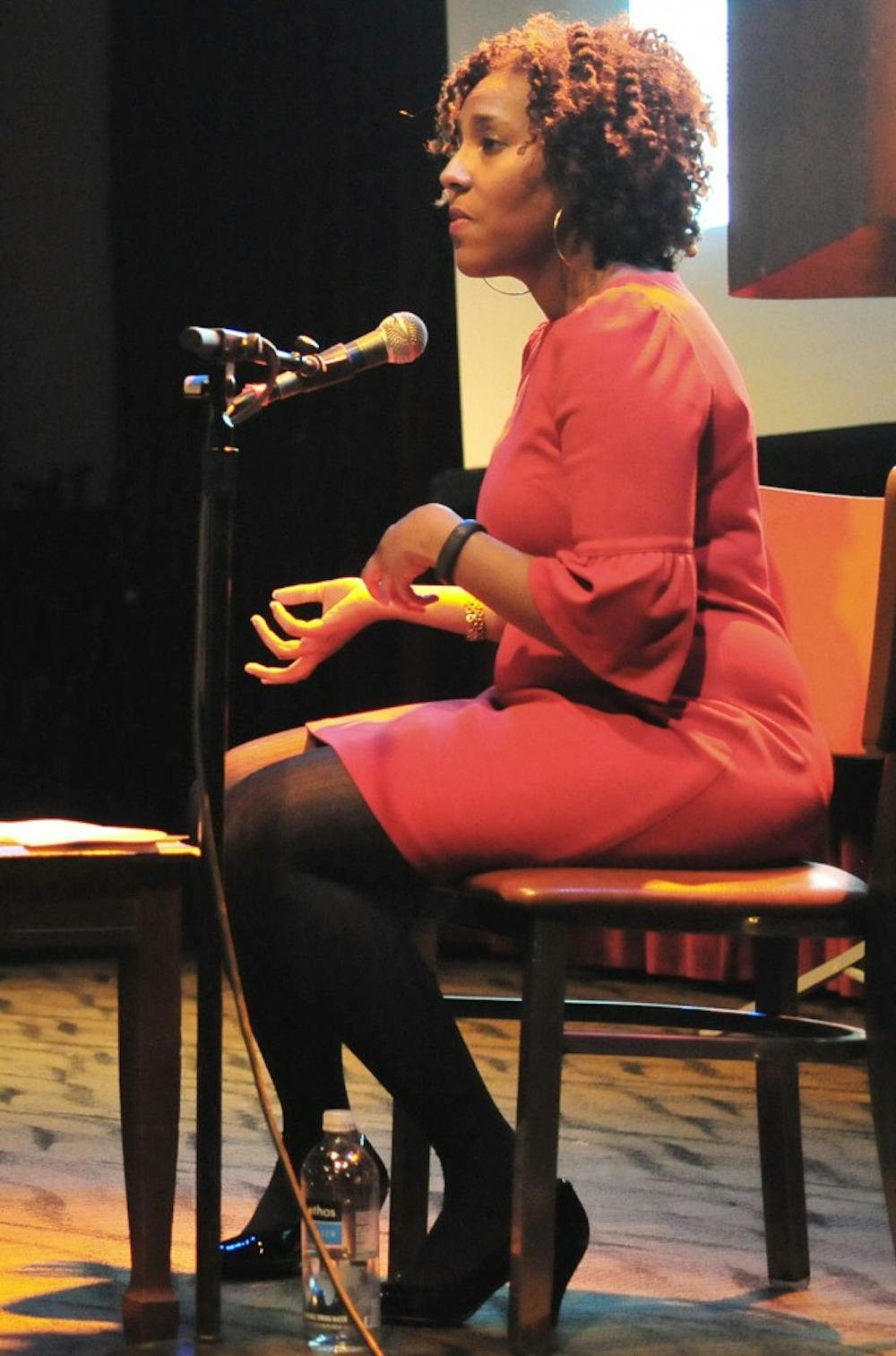
On Tuesday evening, students, faculty and members of the greater Philadelphia community gathered at World Cafe Live for the first Lightbulb Cafe lecture of the year.
Sitting at candle-lit tables and sipping on the Cafe’s happy hour drinks, the audience waited to hear assistant professor of English and Africana Studies Salamishah Tillet’s lecture “From Douglass to Django: Slavery and Freedom in the Age of Obama.”
Penn Lightbulb Cafe is a free public lecture series presented by the School of Arts and Sciences and the Office of University Communications. Jacquie Posey, a news officer in the Communications Office who organized the event, said the series presented “speakers who shed light on the arts, social sciences and humanities.”
Last night, the focus was on cinema studies, particularly in the films “Django Unchained” and “Lincoln.” Posey explained that the theme was very topical, because both films were nominated at Sunday’s 85th annual Academy Awards and February is Black History Month.
Tillet, a 1996 College graduate, discussed the historical backdrop and significance of these contemporary films in the context of the “Obama era.” During her presentation, she drew heavily from her recent book, “Sites of Slavery: Citizenship and Racial Democracy in the Post-Civil Rights Imagination.”
Tillet opened her lecture by recounting two anecdotes from the Academy Awards and the Golden Globes. She was “deeply disturbed” by Oscar host Seth MacFarlane’s joke addressed to “Lincoln” leading actor Daniel Day-Lewis: “If you bumped into [black actor] Don Cheadle on the studio lot, would you try to free him?”
The second controversy that troubled Tillet was that of “Django Unchained” director Quentin Tarantino dropping the N-word after the Golden Globes, to which Cheadle responded, “Please no n——- questions. Black people questions are all right.”
Tillet used these two anecdotes to argue that there is a conflation of the N-word, slavery and blackness in the 21st century. Her book seeks to examine how contemporary black artists address slavery in order “to challenge the national silence about racial inequality in the present and model a more robust democracy for the future.”
In order to put her book in context with her lecture on Hollywood’s depictions of slavery, Tillet went through the most famous 20th-century representations of the institution in film, from 1915’s “Birth of Nation” and 1939’s “Gone With the Wind” to 1998’s “Beloved.”
“These are the primary ways that Americans understand slavery,” Tillet said. “It is not a topic that American filmmakers are comfortable pursuing.”
Tillet then went on to argue that “Django Unchained” and “Lincoln” are about the moment that we live in now, as well as the past. She explained that Lincoln and Django are both heroic characters that the public wants to see portrayed. Django stands above the black community and “represents a version of exceptionality that someone like Obama represents.”
The “Obama era” has enticed a new abundance of such neo-slave narratives taking place in the antebellum South, she added.
Soon after, Tillet made her point about black citizenship.
“The discussion of the past is about citizenship,” she said. She explained that there is a strong feeling in the black population of not belonging, a feeling she terms “civic estrangement” in her book. The paradox, she said, is that blacks are citizens, but also non-citizens, because of the way they feel.
Tillet questions whether this is changing in the Obama era.
In an interview with The Daily Pennsylvanian, Tillet said that she thought “Lincoln” was a really good film, but she had her doubts about “Django Unchained.”
“I don’t know if Django should have won best original screenplay,” she said. She also expressed doubts that a black filmmaker would have received the same critical or commercial acclaim.
“Who is really able to tell the story of slavery?” she asked.
The Daily Pennsylvanian is an independent, student-run newspaper. Please consider making a donation to support the coverage that shapes the University. Your generosity ensures a future of strong journalism at Penn.
DonatePlease note All comments are eligible for publication in The Daily Pennsylvanian.





